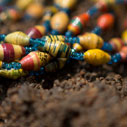Arriving in Uganda three days ago, I am now in Gulu. The fact that I am blogging this, from an airconditioned coffee shop in safety should immediately give you a hint that you shouldn’t believe everything you read in the papers.
For the most part, the last few days have been occupied with moving around, settling in and setting up meetings for the coming week. Tonight we will hopefully start interviews with some local women and a UNHCR official who knows more about what is happening in and around Gulu at the moment. Tomorrow, we will be meeting various ex-soldiers in the Chope camp for internally displaced people. On Tuesday, local women’s groups and possibly some microfinance projects.
Impression-wise, the first couple of days here have been vastly educational. When I am on a full size keyboard and able to post photos and video, I’ll be able to share a far richer picture of life here with you. Unfortunately, I have neither capacity at the moment, since all my images are in RAW format and I have nothing that will open them for editing or saving to jpeg. And a netbook makes for rapid wrist strain after half an hour or so.
Except for everything I had read, it would never have struck me that this area had been the site of such previous disaster.
All of this complaining aside, the first and biggest thing that struck me entering Gulu was how normal and functional it seems. Markets full of fruit and vegetables, guesthouses of all stripes and star ratings, and taxis ferrying people in every direction. Except for everything I had read, it would never have struck me that this area had been the site of such previous disaster. It’s not to say that tragedy doesn’t exist – it’s here, and I am sure tomorrow will see enough painful interviews to continue to add to the recorded history of the Lord’s Resistance Army. Importantly, though, it’s not everything. It’s a part of people’s lives, but it’s not the thing that seems to define the place. Gulu and Northern Uganda are no more a war-torn disaster zone than South Africa is it’s apartheid history or Ethiopia is starvation or hunger.
It’s an obvious thing to say, but it’s something that gets lost in the continual media reporting on the one thing that is exceptional to the area. And when all that is published about this place is war and sadness, it becomes easy to slip into seeing little else. You become blind to the parents who are schooling their children. The shopkeeper who shares a smile, a joke, and some patient lessons in basic Acholi. The thousands of people doing a multitude of perfectly normal things with their day. When somewhere has been so hyped up for its sad past, it’s ironic that the normality with which people pursue their lives is the most startling thing about it.
There’s a lesson there. The first, no doubt, of many.

